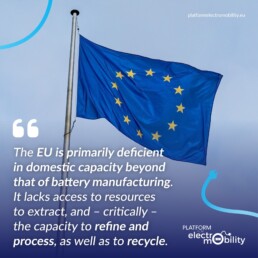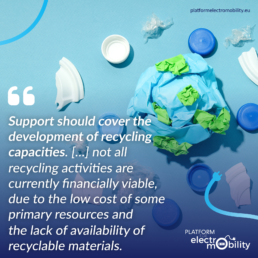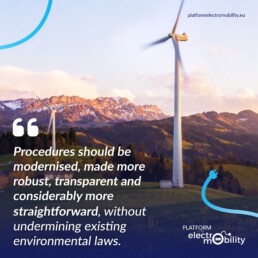Where the Critical Raw Material Act should critically act
The vital transition away from fossil fuels to cleaner technologies such as electric transportation – cars, trucks, buses, trains and public transport – will drive the demand for raw materials. Lithium, nickel, copper and cobalt will all be required in varying amounts depending on the technologies and applications.
Whilst certain Critical Raw Materials (CRMs) are accessible on the EU territory, Europe remains largely dependent on third countries for mining, processing, refining and recycling. This dependency has been accentuated by current geopolitical events and supply chain tensions, which have led to volatility, increasing prices and uncertainties over global supply. For this reason, we strongly welcome the principle of today’s Commission’s CRM Act, and we will shortly publish a detailed assessment from the perspective of the electromobility ecosystem.
Three clear flaws for Europe on CRMs
In light of the urgently required transition to e-mobility, and the need to ramp up a domestic Electric Vehicle (EV) value chain in Europe, there is a clear flaw; the EU is primarily deficient in domestic capacity beyond that of battery manufacturing. It lacks access to resources to extract, and – critically – the capacity to refine and process, as well as to recycle. Such processes are still undertaken almost entirely in resource-rich, more experienced and more competitive third countries. This is endangering both Europe’s autonomy in CRMs and the respect of the upmost environmental standards.
It is therefore vital that Europe builds its own processing and refining capacity for battery materials, using existing domestic sources of valuable materials. Europe must also increase its recycling capability and competitiveness in order to reduce the EU’s dependence on primary raw materials.
The second flaw is the excessive hurdles to the permitting. In particular, the range of mining codes that exist in Europe creates incoherence and differences in the levels of ambition between Member States, which in some cases may threaten safeguards to social and/or environmental protection. The processes for granting permits becomes excessively lengthy when multiple permits are needed for both renewable energy production and for sustainable mineral extraction projects.
The third flaw is the limited availability of sustainably sourced, highest quality materials, in no small part due to incomplete and limited mapping of geological and remining potentials. There are also barriers to the reuse and repurposing of EV parts, which could extend the lifespan of CRMs prior to recycling, thereby reducing the overall demand for CRMs. Member States lack the expert capacity to ensure the efficient, robust and timely evaluation of Environmental Impact Assessments and Area Assessments.

Consequently, the Platform for electromobility wishes to highlight the need for the EU’s Critical Raw Materials Act (the Act) to consider to the following 12 areas:
We welcome the objective of establishing a single European strategy on raw materials that defines expected needs, challenges, priorities and key lines of actions. We also welcome the specific objectives of reducing the need for primary CRMs – with efficient repurposing, reuse and recycling – while maintaining high environmental and social standards and increasing security of supply. The objective of a coherent, EU-wide strategic Act should be to prevent the creation of numerous small initiatives triggering competition within and between Member States, and to develop an integrated and coherent development strategy for allocating resources more efficiently.
The Act should consider the demand for strategic raw materials across all e-mobility sectors. Batteries are of critical importance for the success of the EU Green Deal. The competitive environment in which battery manufacturers operate has evolved significantly since the first EU Battery Action Plan was developed in 2018. The Act offers the opportunity to update the EU Battery Action Plan and articulate the steps that Europe should take to support battery roll out.
Those economic actors meeting the highest existing environmental standards (such as for mine tailings) and social standards (such as community consultation) should be eligible for financial and political support.
Support should cover the development of recycling capacities. This is important because not all recycling activities are currently financially viable, due to the low cost of some primary resources and the lack of availability of recyclable materials. Support for developing recycling capacities is therefore vital to the circularity and sustainability of CRMs sourcing; any barriers to boosting such capacity should therefore be dismantled. In the example of battery manufacturing, circularity implies that valuable recycling resources – such as end-of-life batteries, battery waste, black mass and battery manufacturing waste – must remain available and easily shippable for the European recycling and battery materials industry.
Support could take the form of funding, tax reductions, grants, equity or project finance, granted to those companies who are rethinking the design of their products with a circular approach to reduce their raw material consumption or their use of non-critical substitutes. Furthermore, those companies who can demonstrate effective results in reducing their use of primary materials should presented as examples of good practice by the EC.
Such support would incentivise efforts to keep valuable battery materials in Europe, to keep them available for domestic recyclers. This would justify current investments in such materials in Europe through measures incentivising the recycling of battery manufacturing waste and black mass/BAMM (Batteries Active Materials Mixture).

Sourcing should be both adequate and sustainable. The legislation should focus on ensuring an availability of supply that respects both human rights and environmental standards, regardless of the country of origin.
Mechanisms to incentivise the use of secondary raw materials should be introduced, to ensure that secondary sources of CRM (and potentially other common materials) in the EU value chain are used to their full potential. Incentives can take the form of targets. Targets should be flexible enough to allow the European Commission a degree of latitude to help avoid an excessive burden on economic players or creating market distortions.
The list of CRMs should be further developed and updated, potentially evolving from a simple ‘ON/OFF’ list to an actual ranking of CRMs that set a priority (to also be extended to other materials). We think that certain materials (such as silicon) should be given a higher priority.
It is important to integrate the raw material strategy with the objectives already contained in the Circular Economy Action Plan (CEAP), and to include raw materials for green technologies within CEAP priorities. The challenges of decarbonisation and the circular economy must be addressed as a single issue.
The Act should include provisions to de-risk domestic sustainable extraction projects through an EU-wide financial risk mitigation framework, which will ensure investment certainty. Current legislation is not clear on the de-risking process notably for a financial product to de-risk investments in geothermal capacities to extract lithium sustainably. Today, the existence or not of specific financial risk mitigation products required, as an example, for geothermal lithium extraction project development is a determining factor for projects to be given the go ahead or not. Such scheme should be secured at EU level.
Moreover, the Act should also support geological surveys to produce and/or update 3D maps of raw material resources and therefore better determine accessibility of domestic resources.
Alongside this, remining solutions, i.e. mining from existing decommissioned mining sites, should also be considered as integral parts of a sustainable value chain for CRM. Efforts should be made to map this potential and its environmental impact in Europe and subsequently to increase the availability of secondary raw materials. In case of remining, the re-opining of sites should respect all requirements of new ones.
In coordination with ERMA, each Member State should create a National Raw Material Agency (NRMAg) aimed at leading and implementing the national strategy. The structure, tasks and resources of NRMAg should comply with minimum framework requirements as defined at European level.
When solutions for European sourcing (from repurposing, recycling, to remining and mining) are insufficient to meet demand, various options for sourcing CRM internationally should be considered.
For international free trade agreement, due diligence must be considered a basis for negotiating Free Trade Agreements (FTAs) and other potential trade protocols, such as strategic partnerships. This way, we can ensure that imported resources meet Europe’s environmental, economic and social objectives.
Moreover, supporting European stakeholders to directly invest in third countries sourcing capabilities should not be ignored. Acquiring mining capacities in third countries may also be a valuable approach as an alternative to FTAs. With the Act, the EU should also support these ventures when adequate. When using such opportunities, the highest environmental and social standards in third countries should be safeguarded or implemented.
We call for an extremely cautious assessment of the need for stockpiling mechanisms, as they may have unintended negative consequences on the markets and nascent European industries. We do not favour direct market intervention in the form of strategic reserve buying or policies designed around redistribution schemes. Policies designed to build strategic reserves risk artificially inflating prices, which will undermine the development of those European producers of value-added goods who are dependent on these CRMs.
The Act should not yield on any weakening of environmental regulations, but rather should offer the opportunity to safeguard key ones as a condition.
Most importantly, the carbon footprint calculation of the Act should complement the recently adopted Battery Regulation. The calculation for the environmental footprint should be based on the energy mix used at the production phase and that for transport, supported by the appropriate documentation. Details on the Bill of Material and relative origin (primary or secondary raw materials) could be required.
The EU should reduce its dependency on imports of materials of strategic importance for production. Sourcing should take place within the EU and should include the use of secondary raw materials from waste. As not all recycling activities are currently financially viable due to the low cost of some primary resources and the lack of availability of recyclable materials, support for developing of recycling capacities is vital for enhancing the circularity and sustainability of CRM sourcing.
Some products, such as electric motors, may contain CRMs that are not typically indicated on the products. In order to help improve their collection, recovery and recycling, we suggest creating a system of specific and mandatory marking for products containing CRMs (via labels or QR codes, for example), relevant with the European Battery Regulation.
A clear and homogeneous framework for waste regulation is also needed to encourage reuse and recycling, in line with the EU waste hierarchy. Removing administrative obstacles and barriers arising from different legislations can favour the circularity of materials, clarifying limits and opening up new opportunities for enhancing materials, reducing waste generation as a result.
However, excessive recycled content requirements could have the adverse impact of increasing the dependence of European companies. Additional measures should also be considered to make it easier for recycling companies to access black mass from European operations.
Finally, a well-functioning internal market for second-hand raw materials (one with transparent, clear and homogeneous trading rules) would make it easier to implement recycling, repurposing and reuse activities in strategic value chains. This would help minimise environmental and social impacts and enable the development of local specialised hubs.
As highlighted in the introduction, irrelevant permitting procedures represent a significant hurdle. Procedures should be modernised, made more robust, transparent and considerably more straightforward, without undermining existing environmental laws (such as the Industrial Emissions Directive, Water Framework, Habitats Directives) and in compliance with environmental, social and corporate governance criteria. Support with expert capacity at national level for authorities that grant permitting is also needed. Furthermore, digitalising the permitting process would ensure transparency and full engagement, from project developers to local communities.
Ad hoc incentives, along with rigorous but simplified licensing, would also encourage the development of local and more-sustainable supply chains. Policy actions remain to be identified for best practices by other countries, such as tax incentives and innovation funding. This would also create new jobs and mitigate potential social impacts related to energy transition.

It would be useful to consider the potential links and synergies between the CRM Act and other legislations already in place (such as the environmental and human rights regulations) and to ensure consistency between the various pieces of legislation to meet the needs of the CRM demand sector.
A stable, long-term and fit-for-purpose regulatory basis is the precondition for investing in the EU raw materials value chain. The Act should not overregulate elements of the battery value chain that have already been addressed in other legislation. A particular example is the Batteries Regulation proposal; this has already introduced – among many other sustainability provisions – ambitious recycled content objectives, recycling efficiency and metal recovery targets and detailed responsible sourcing requirements.
Incoherence or duplication between EU chemicals management policies and the Act’s ambition to support the energy transition and climate neutrality objective should also be avoided.
For example, the proposed classification of lithium salts as a ‘known reproductive toxicant’ could have negative consequences for the security of the EU’s lithium supply. Without global scientific agreement or international harmonisation of such classification, such a measure might limit access to lithium for the EU, creating potential problems of supply. The EU must avoid becoming as dependent on minerals as it currently is on oil and gas. Unfortunately, the classification of lithium risks making EU Member States less attractive for lithium mining and refining projects compared to third countries, which remove roadblocks to investing in the lithium value chain. Any such investment would attract excessive levels of uncertainty, due to ambiguities surrounding the risk management measures that the classification could entail in the coming years. Decisions on investments in lithium capacity need to be taken within the next three years in order to be ready for 2030, when global supply constraints are being forecast. Projects need sufficient time to be able to deliver raw materials to the market, hence the market needs to have a clear signal to invest in Europe now.
Efforts must be made, in the context of the 2023 EU Year of Skills, to increase the coverage of CRMs in University Master programmes and to raise awareness around the issue in our next generation workforce. Skills shortages are particularly acute for geology and low-environmental-impact mining specialties, which are currently only present in regions with active mining industries.
Ad hoc incentives would help develop local and more-sustainable supply chains. Policy actions should be defined carefully, and should assess worthy examples adopted by other countries such as tax incentives and innovation funding. Such an approach would also create new jobs at local level and mitigate potential social impacts relating to the energy transition.
Additionally, skills-based visa schemes for raw material professionals currently based in third countries may help fill existing human capital shortages in the short term.
ERMA will play a key role in ensuring a successful approach to critical raw materials, but needs to be further empowered both in governance and financial terms. It requires a mandate to ensure the achievement of European Strategy targets, leading all European Union initiatives on raw materials endowed with all the necessary levers. The current Alliance mechanism for involving players along the value chain should remain; however, as the investment needed will be relevant, it will also be important to support those initiatives that achieve the critical mass to become game changers. Here, it is fundamental that ERMA should have a full overview of the levers that EU is putting in place (regulatory, financial, etc) and that it should be a driving force in implementing the strategy. All raw materials-related initiatives should fall within the overall ERMA framework.
In coordination with ERMA, each Member State should create a National Raw Material Agency (NRMAg) aimed at leading and implementing the national strategy. The structure, tasks and resources of NRMAg should comply with minimum framework requirements as defined at European level.
